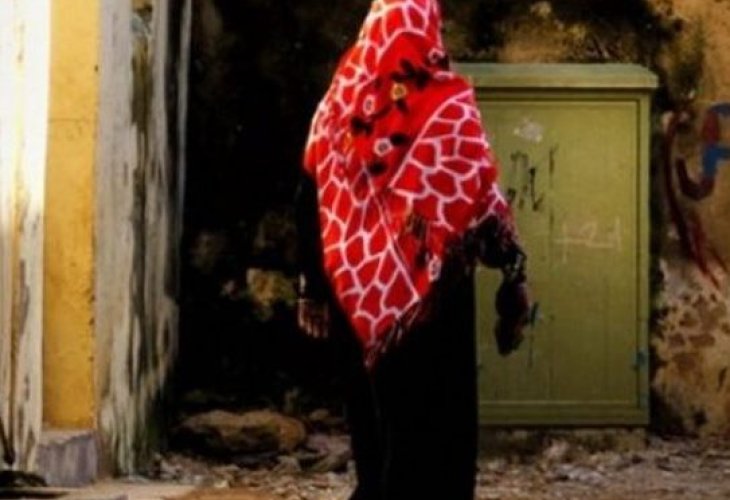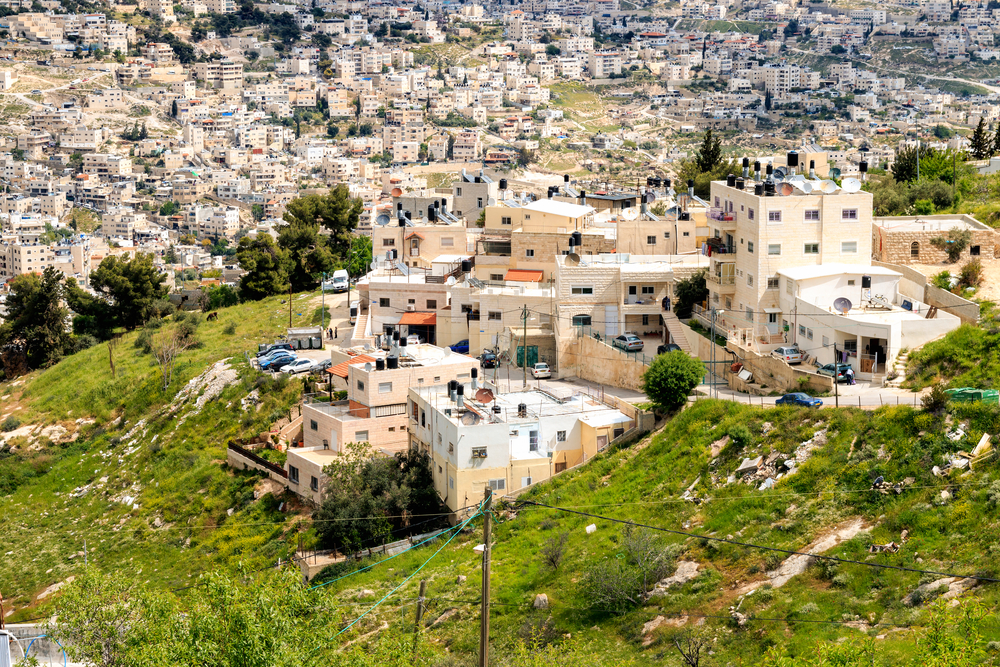A Chilling Testimony: I Never Believed I Would Leave Here Alive
He stopped the car, once again donned a gentle expression, and offered her jewelry as a gift. Then he promised it would be just a short visit and they'd return immediately.

For several years, Avital lived in an Arab village with a dominant family that forced Islam on her. Miraculously, she was rescued by the Hidabroot organization. On the eve of reading the Megillah, she remembers the story and shudders.
In a few days, we will all sit to read the Megillah, make noise with graggers, and hear the tale of the miracle that took place in Shushan, the capital of Persia. But if you ask Avital (a pseudonym for a very real woman), she'll tell you that the city of Persia relates not only to the Megillah story but also to her family, personal, and spiritual life—essentially, the essence of her life.
Her story is nothing short of fascinating, yet at the same time, chilling and horrible. "I was born in Persia," she recounts, "I immigrated to Israel as a child and lived with my parents in Jerusalem. I married young, but after a time, I realized we needed to separate, and that’s what we did."
Avital found herself alone. "I went through a very hard time. I returned to live with my parents in Jerusalem. After much persuasion from my parents, I agreed to look for a job and found work as a cashier in a supermarket."
Yet, right when Avital began working, everything fell apart. Avital met 'Avi' in the supermarket, as he initially introduced himself. "He was a young and gentle guy, very gentle," she emphasizes. "From the first moment we met, I felt he had what I was looking for. We started going out every day after work, hanging out. Very quickly, it became serious; we would spend hours together. Then one day, he told me he wanted to introduce me to his parents."
Only at this stage Avital says she suddenly noticed he never told her anything about his family. She tried asking him where they lived, but he avoided it and only asked her to get in the car.
At that moment, her nightmare began. She notes that during the drive, she realized they were heading towards the Arab villages near Jerusalem. Suddenly, everything became clear—Avi wasn’t really Avi, and he wasn't Jewish at all.

But then he stopped the car, donned that gentle expression again, and offered her a piece of jewelry as a gift. Then he promised it would be a short visit and they’d return immediately. Avital was convinced. "It was hard to grasp how he was so nice, yet not Jewish," she says.
The visit to the parents was acceptable. "The family was already waiting for me, and they served food. They checked me from head to toe, but still tried to be very nice. His father approached me and said I could borrow their family car anytime I needed one. Avi drove me home, leaving me with my thoughts and confusion."
Those days, Avital didn’t tell anyone about her new connections. "In hindsight, I can say that I already felt something was very problematic," she says. "But I convinced myself that no binding relationship had formed yet and perhaps this was temporary, so why get stressed? I felt all along that I shouldn't generalize and that the guy I knew was different, and his family wasn't like everyone else. So, I kept things secret and didn’t tell my parents anything. I didn’t want them persuading me to cut off ties."
"I Gave Birth to My Daughter in the Village"
Soon, another visit to the family in the village followed, and then another visit, during which an enticing offer was made: to stay and live there, receiving a separate unit connected to the parents' house. "We will give you everything," the young man's mother promised Avital, "You can work in our family business and earn a lot of money, and your husband could work with us as well. You won’t lack anything."
Even this time, Avital couldn’t refuse and convinced herself everything was temporary and non-binding and that she could return whenever she wanted. So, they moved to live with the family in the village. But soon, the family turned out to be deceitful. "They truly involved me in their family business, but they didn’t pay a cent; instead, they said, ‘We’re giving you food, a place to sleep, make do with that.’ Thus, I became dependent on them for everything in my life."
The next stage came quickly; they started openly hating her. "Whenever Ibrahem (Avi) left the house, his mother hurled hostile, hate-filled words and even threw objects at me," Avital recounts. "Their eyes were filled with so much hate, it was horrible. The shouting at home was unbearable; they would just scream all the time, especially at me. They simply hated me, cursed me nonstop, and wouldn’t let me speak a word in Hebrew, only Arabic."

How did Ibrahim treat you?
"With Ibrahim, it worked in phases. There were days when he was calm, but most days he joined his family. I was required to stay in my room all day, and most of the time, I was alone."
A few months after Avital moved into the village, she gave birth to a daughter. "She was born at home," Avital tearfully remembers, "I begged to be taken to the hospital, but they refused. She was born without any medical supervision, without painkillers, without anything."
The Daring Rescue
A year passed, and Avital had another daughter. "At this stage, I could no longer think about staying. I realized this couldn't continue," she says. "Moreover, what hurt me most was that every morning, Ibrahim's family would come to my room and take my daughters for Islamic preaching, bringing them back in the evening. It caused me so much sorrow, and I had no one to cry to."
One day, when something extraordinary happened and the whole family went out, Avital managed to contact a friend who gave her the phone number of the Hidabroot organization's anti-assimilation department. She called them, all panicked, fearing the Arab family might return at any moment and discover her.
From that moment, things developed at a dizzying speed. The organization informed Avital to be ready on a certain day, and with Hashem's help they would set her on a new path. "They kept telling me: ‘You are not alone; a whole organization stands behind you,’ which gave me a lot of strength. As the rescue day approached, they also instructed me: ‘You don’t need to take anything, just yourself and your daughters. We’ll take care of everything else.’ But I still didn’t understand how I would have everything and how I would manage to leave the house unseen. I was very scared; there were moments when I thought of giving up on this freedom, but Hidabroot kept convincing me that if I didn’t leave now, I’d never have another chance and would remain in the village for life. They gave me so much strength."
On the specified day, the organization representatives called Avital, informing her as planned—they were on their way to get her. "The representatives who arrived instructed me to tell Ibrahim that I’m going out with the kids for a stroll and to take the car keys. I told him: I'm just going for a stroll, not going anywhere, you see? I even have your car, so it’s a sign I'm coming back."
But once she stepped out, the representatives led her out of the village and they drove her to a remote area in the country. "They told me all along not to worry because they would return the car, and everything would turn out fine," she recounts.
How did you feel?
"I felt immense pressure, I could hardly breathe. I just kept hugging my daughters, I was so scared. Only when I reached the rescue apartment, realizing no one knew where I was and understanding that I was finally free, could I begin to relax a bit."
At the apartment, Avital and her daughters were welcomed by organization activists, residents of the area, who took care of everything they needed. "To this day, they haven’t left me," she says gratefully. “My daughters attend Jewish kindergartens, I started working, and we can truly say we were born anew.”
Blessed for Not Making Me a Non-Jew
But only after the rescue operation ended, did the organization representatives reveal to Avital the incredible story that took place behind the scenes. It turned out that at the same time she was rescued, the organization's rabbis were on a strengthening lecture tour abroad, when a local resident, a Persian-Jewish mitzvah observer, approached one of the rabbis with an envelope containing a donation, asking that the money be used for rescuing a Jewish woman from assimilation. This money was used for Avital's rescue and the significant expenses involved.
Almost a year has passed since that escape, and these days, as Purim approaches, Avital notes that the Megillah story particularly excites her. "They saved me from the clutches of evil, which undoubtedly would have eventually led to my disappearance, perhaps even to my murder in the village. And who was chosen to be part of my salvation? A Persian Jew, while I myself am Persian, so how can one not be moved anew every day by this loving providence?” she asks.
Blessed for not making me a non-Jew and separating us from the mistaken, returning me to life...
Shvuyot – the Anti-Assimilation Department, for inquiries and reports: Tel 073-2221333 or 052-9551591. Emailkalina@htv.co.il

